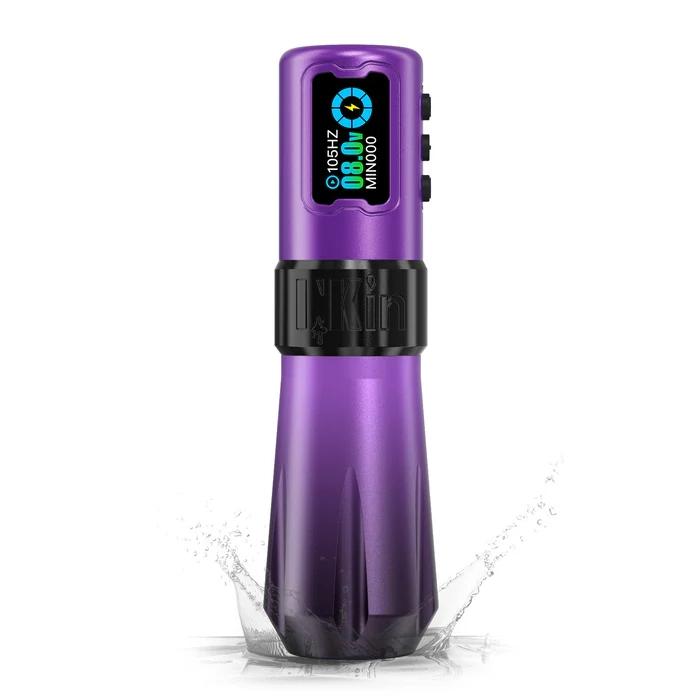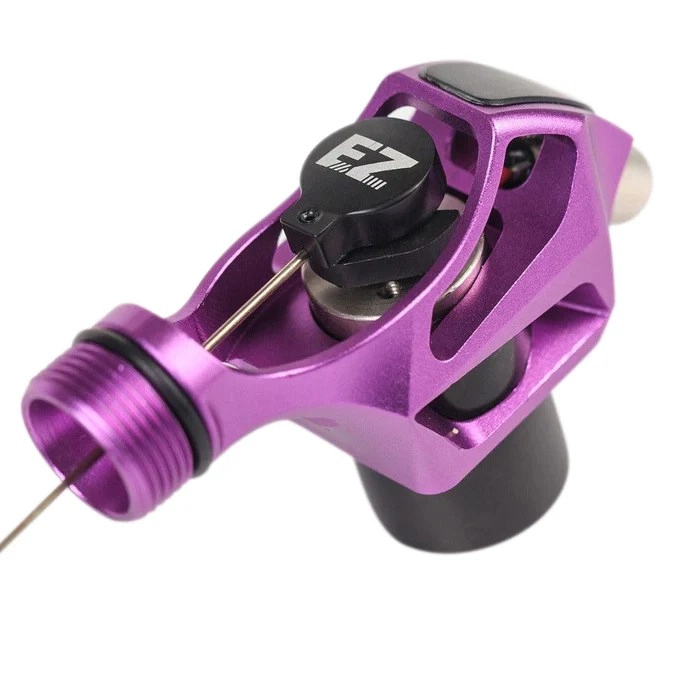Dive into the fascinating realm of tattoo machines! Uncover the distinctions among coil, rotary, and pen-style devices, their special perks, and how to pick the ideal one for your artistic flair. Master upkeep tricks and locate trustworthy providers like Yaba for premium equipment!
Coil Tattoo Machines
Coil tattoo machines are a cornerstone in the tattoo world. They function via electromagnetic coils that shift a spring-loaded bar upward and downward briskly. This action propels the needle into the skin, crafting exact patterns. These gadgets are famed for their unmistakable humming noise and their knack for granting superb command over needle depth and pace. The build of coil tattoo machines is sturdy, rendering them tough and dependable. They arrive in diverse setups, like liners and shaders, each tailored for particular jobs. Liners excel at sketching tattoo borders, whereas shaders shine at coloring in or softening areas.
Advantages of Using Coil Tattoo Machines
Coil tattoo machines boast numerous strengths that position them as a favored pick for many creators:
- Tailorability: You can tweak the device’s settings effortlessly to match your approach or a design’s demands.
- Accuracy:Their structure permits precise mastery over the needle’s motion, delivering crisp strokes and intricate details.
- Robust Output:These units pack a potent punch, making them apt for elaborate patterns and striking contours.
- Diversity:With distinct units for outlining and shading, you can produce varied looks with pinpoint precision.
Common Applications in Tattooing
Coil tattoo machines are adaptable instruments used in a range of tattooing methods. They thrive at forging sharp edges, delicate minutiae, and fluid shading. Artists frequently turn to these devices for classic tattoos needing vivid lines and rich hues. Moreover, they suit bespoke artwork where exactness is paramount.
Rotary Tattoo Machines
Rotary tattoo machines work on a contrasting principle to coil ones. They employ a tiny electric motor to guide the needle in a steady, circular whirl. This leads to hushed performance and gentler needle travel.
Key parts of rotary tattoo machines include:
- Motor: Fuels the unit with unwavering vigor.
- Cam Wheel:Transforms spinning motion into straight-line action.
- Frame: Encases all elements securely.
These devices are featherlight and thoughtfully shaped, easing wrist strain during prolonged tattoo stints.
Benefits of Rotary Tattoo Machines for Artists
Rotary tattoo machines have surged in favor thanks to their plentiful advantages:
- Silent Running:Unlike coil units, they emit scant sound, fostering a calmer space for artists and clients alike.
- Flexibility:One rotary device can tackle outlining, shading, and tinting by merely swapping needles or tweaking settings.
- Simplicity:They’re novice-friendly due to their uncomplicated workings.
- Gentler Skin Impact: The fluid motion lessens skin irritation, aiding swifter recovery.
Popular Uses in Different Styles of Tattoos
Rotary tattoo machines are perfect for a broad array of aesthetics. They shine in crafting lifelike portraits with tender shading and seamless blends. Artists also favor them for delicate line work owing to their finesse and mild touch. Be it grayscale realism or vivid illustrative pieces, rotary units yield reliable outcomes.
Pen-type Machines
Pen-style tattoo machines emulate the sensation of gripping a real pen, offering unmatched ease and mastery. These units harness a rotary system akin to standard rotary gadgets but are nestled in a slender, pen-like casing.
The motor within drives the needle with exactness, letting artists fashion detailed artwork smoothly. The comfy grip curbs hand tiredness during extended sessions.
Unique Features of Pen-type Tattoo Machines
Pen-style tattoo machines distinguish themselves with their inventive traits:
- Sleek Build:Their light frame makes them a breeze to wield.
- Comfy Hold: Enhances control over every move.
- Cartridge Needles:Streamline needle swaps without halting your flow.
- Steadiness: Offers even results across varied skin textures.
These qualities make pen-style units a stellar choice for meticulous tasks needing precision.
Why Choose Pen-type Machines for Specific Needs
Pen-style tattoo machines are ideal for creators who value comfort and exactitude. Their trim design cuts fatigue, letting you hone in on fine points without distraction. These tools excel in micro-realism tattoos where tiny details are key. Plus, they’re highly portable, fitting for roaming artists or convention-goers.
Yaba: A Reliable Supplier for High-Quality Tattoo Machines
Selecting the perfect tattoo machine is vital for every skilled artist. Yaba emerges as a dependable ally, presenting a wide assortment of top-tier tattoo machines crafted to suit diverse artistic styles and methods. Whether you’re a veteran creator or embarking on your tattoo path, Yaba delivers tools built for accuracy, endurance, and coziness.
Range of Products Offered by Yaba for Professional Artists
Yaba prides itself on a vast catalog of tattoo machines catering to assorted creative tastes. Their offerings span coil machines, rotary units, and pen-style devices, each designed for peak performance.
- Coil Machines:Known for their solid form and precise needle control. They come in setups like liners for sketching and shaders for tinting or softening.
- Rotary Machines:Featuring a hushed, motor-driven system, they offer adaptability for both outlining and shading with minimal skin disturbance.
- Pen-Type Machines:Shaped for ergonomic use, these mimic a pen’s feel. They’re perfect for intricate artwork needing fine touches.
Yaba ensures every item is made with superior materials to endure long usage while delivering steady results. Contact them now!
Conclusion
Tattoo artists depend greatly on their gear to bring their imaginative visions to fruition. Yaba’s dedication to excellence and ingenuity makes them a steadfast collaborator for pros seeking reliable tattoo machines. By providing a variety of choices suited to different aesthetics and techniques, Yaba empowers creators to reach brilliance in their work.
FAQs About Tattoo Machines
What are the primary differences between coil and rotary tattoo machines?
Grasping the variances between coil and rotary tattoo machines can guide you to the right tool for your needs:
- Mechanism: Coil units use electromagnetic coils to shift the needle up and down. Meanwhile, rotary ones rely on an electric motor for a smooth, circular sweep.
- Sound Level:Coil devices emit a notable hum, whereas rotary ones run quietly.
- Uses: Coil machines shine at crafting bold borders and lively shading. Rotary units are versatile, adept at both outlining and shading duties.
- Skin Effect:Rotary machines lessen skin trauma with their gentle motion, making them a go-to for sensitive-skinned clients.
Both types carry unique strengths, so your pick hinges on your creative flair and client needs.
Are pneumatic tattoo machines suitable for beginners?
Pneumatic tattoo machines run on compressed air rather than motors or coils. Though they boast perks like a light build and low noise, they might not suit novices for these reasons:
- Price: Pneumatic units often cost more than classic options like coil or rotary devices.
- Skill Needed:Using pneumatic setups demands know-how with air compressors and pressure tweaks.
- Rarity:These units are less widespread than other kinds, curbing access.
For newbies, starting with easy-to-use rotary or pen-style machines is wise before venturing into pneumatic territory.
How can I maintain my tattoo machine to ensure durability?
Proper care is crucial to keep your tattoo machine humming smoothly over time. Here are some pointers:
- Routine Cleaning:Wipe down your device after each use with approved sanitizers. Focus on spots where ink or fluids might gather.
- Lubrication:Dab a bit of lubricant on moving bits like springs or bearings (for coil or rotary models).
- Component Checks:Regularly eye screws, springs, and other parts to ensure they’re tight. Swap out worn pieces quickly to dodge hiccups.
- Storage: Keep your machine in a dry spot away from dust and dampness. Use protective pouches when on the move.









